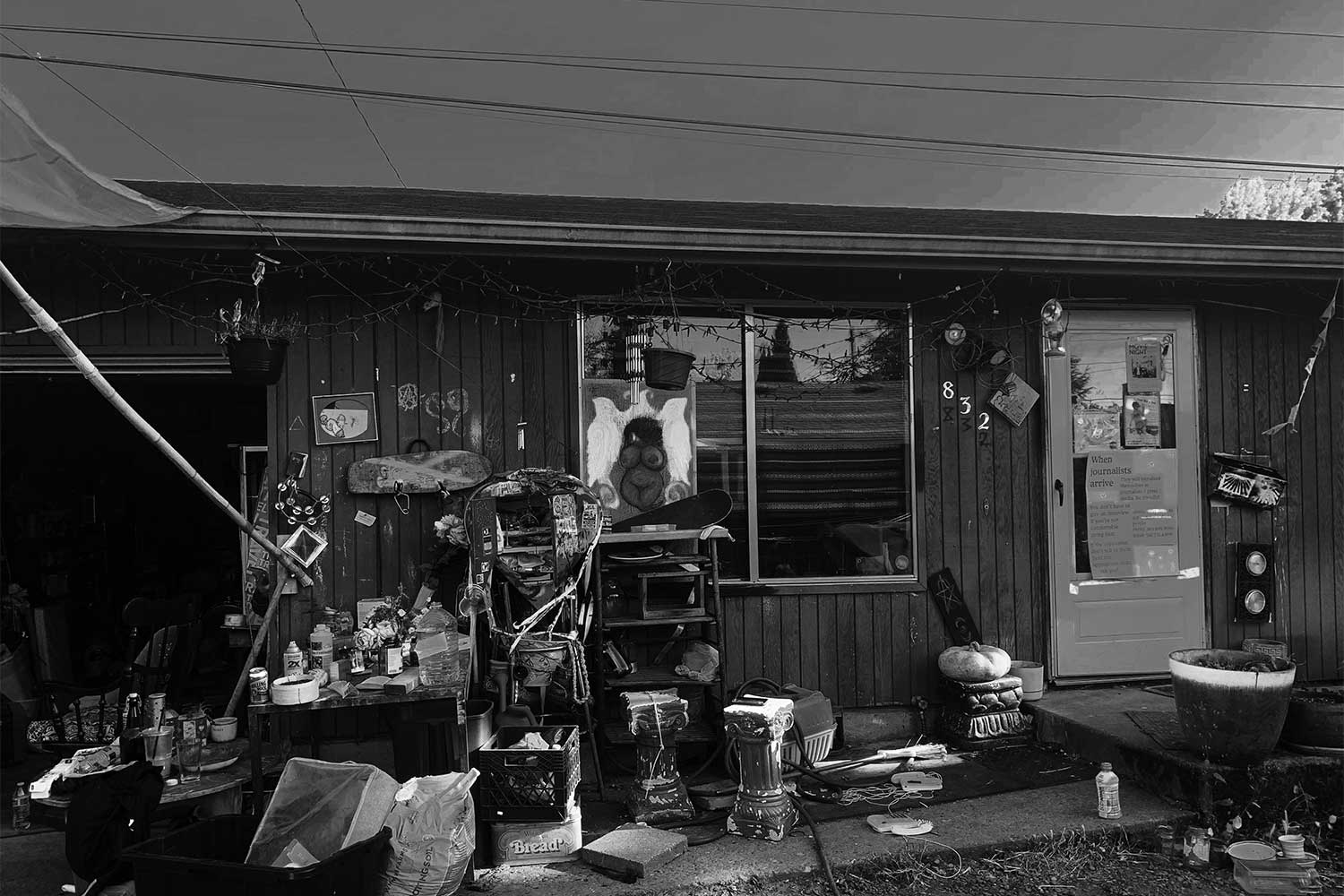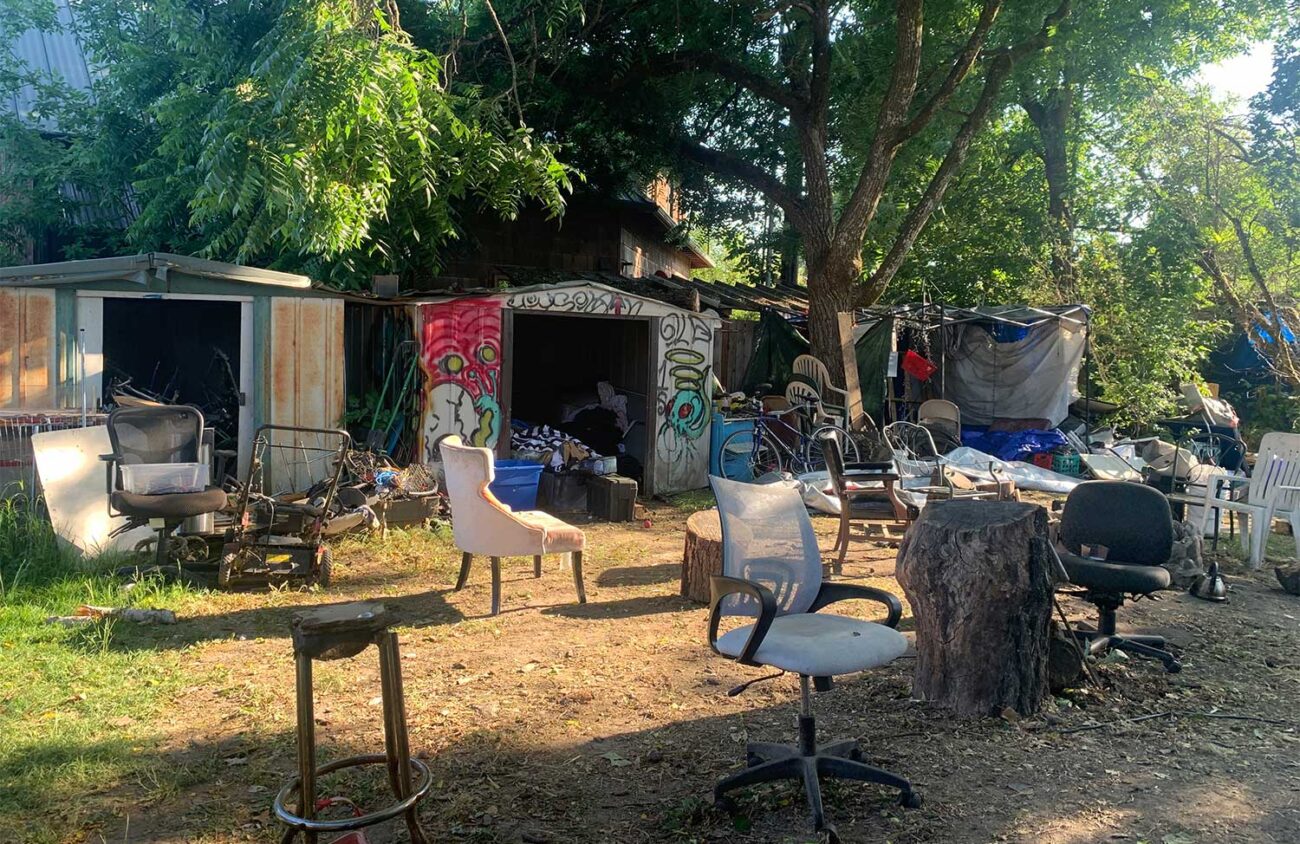Candice King and her children live in an older red house just minutes away from downtown Eugene. The house is lived in: There’s artwork scattered across the outside, a TV set up in the garage, and so much stuff. Everywhere. Chairs on the lawn, tents in the backyard for unhoused neighbors, slacklines, lamps, toys, forts and kids playing in the yard.
“When I hear all of my neighbors’ wind chimes hum at night it sounds like temples in India,” King says. “It’s that beautiful. It’s my home.”
King’s abundant decorations scattered across her yard indicate that this is her home; her landlord, Sharon Prager and R&R Properties, beg to differ as they are the out-of-state owner and the management of the property. The fight between working class citizens who can’t afford to own homes and the property management companies and landlords who dominate the housing market goes on.
King and her four children, like 52 percent of people in Eugene, live in a rental. She and her late husband Eric King, who died in May 2022, started renting the property in 2016. After her husband died, King found her job as a housing liaison at Homes for Good difficult to maintain. Their family started living off of Social Security survivors benefits. Scraping enough money to pay rent every month became nearly impossible. When King’s rental assistance ran dry in March she made the decision to stop paying rent, point blank.
Eugene has the second-highest number of people experiencing homelessness in the country per capita with 2,880 people living unhoused, according to the U.S. Department of Housing and Urban Development’s 2022 Annual Homeless Assessment Report. Working as a housing liaison for the homeless population over the course of three years, King understands the difficulties that come with living on the streets
King points to the housing crisis and her community here as reasons she can’t pick up and move. “These people took care of me for months when my husband died,” King says, as she begins to get emotional. “We all take care of each other here.”

Prager lives in San Mateo, California, but owns six properties in downtown Eugene. She inherited four houses on Almaden Street and two on Washington Street from her mother and pays R&R Properties to manage all of her units. Prager has yet to visit the house that King rents.
Prager’s absence from her properties is part of what Erin Grady, an activist and close friend of King’s, as well as King find frustrating about her as a landlord. “She doesn’t know this neighborhood. She does not participate in our community at all. She just collects passive income from working class people,” Grady says.
Prager and R&R Properties’ lawyer, James Gardner, backed out of a scheduled interview to discuss the eviction and the protest that followed, citing Gardner’s court documents as sufficient.
After four months without receiving rent, Prager and R&R Properties filed for eviction. King chose to fight the eviction in court, and a trial was held June 20. According to King, the judge said that morally she agreed with King’s plea to own her house but legally she had to rule in favor of the eviction. On June 22, King was served with papers giving her until June 26 to move out.
Instead of packing her belongings, King invited her family, friends and neighbors to rally behind her and protest the eviction. Outside of King’s house now is a painted sign that reads, “We must love and support each other.” There are tents filled with food and water for neighbors, and the smell of barbecue fills the air. Without context, one might think this was a block party.
Grady says the property management company tried to drop off a moving pod but the driver drove off within minutes of seeing the crowd. Grady says that this protest is not only to prevent King from getting evicted, but to illustrate how bad the housing crisis in Eugene is — especially for Black families.
King says she has made numerous efforts to buy her house from her landlord but was always met with a rejection letter. According to the U.S. Census Bureau, only 45 percent of the Black population in the U.S. owns a home in comparison to 75 percent of white Americans. Systemic racism plagues just about every institution, but its impact on the local housing market is exacerbated by Oregon’s refusal to let African Americans own property until 1968.
One of the main reasons King says she wants to own her house is because of how little R&R Properties and Prager do to maintain the property. King cites poor heating throughout the house, old appliances and a persistent mold problem.
In the trial memorandum Gardner argues that habitability issues do not excuse King’s refusal to pay rent. Gardner also claims that Prager wasn’t notified of any repair issues during King’s time as a tenant. Gardner says Prager learned about these issues with the house after filing the eviction and not from King but from a housing and neighborhood collective called the Eugene Housing and Neighborhood Defense (HAND). He claims that Prager scheduled an inspection upon hearing those complaints.
The house has had maintenance over the years, but King says it has been the bare minimum. She says, for example, her appliances were old and no longer working, so R&R replaced them with newer models of the same brand. Though the models of appliances are newer, they are still faulty. “My stove literally shocks anyone who uses it,” King says.
If King is eventually able to buy the house, she says she plans on putting her time and energy into making it sustainable for her family to live there for years to come. “I want this place for my kids and my neighbors’ kids,” King says. “I want to build a community of working and single parents because we need each other.”
On the morning of July 5, Eugene police and Lane County sheriff’s deputies arrived at King’s house to evict her. King says law enforcement came in through the windows, pushed the family out and the locks were changed. Eugene police referred a request for comment to the sheriff’s office, which said it did not have a statement prepared.
Go to EugeneWeekly.com for updates. For more information about King’s efforts to keep her home, go to EugeneRentStrike.org
